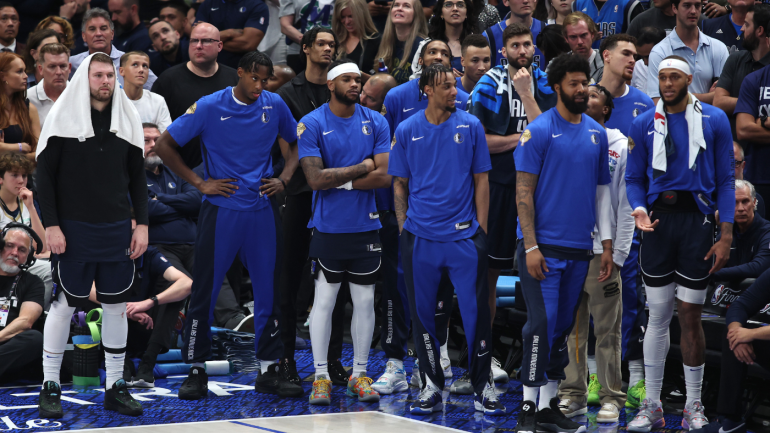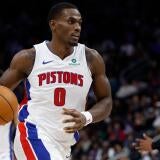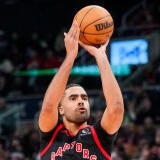NBA Finals: Depth won Game 3 for the Celtics, and it's going to lose the series for the Mavericks
The Celtics are getting far more out of their role players

P.J. Washington made two 3-pointers and scored eight points as the Dallas Mavericks went on a 22-2 run in the fourth quarter to trim a 21-point Boston Celtics lead down to just one. Those numbers might not seem especially notable, but think about them in context. In the first three quarters of Game 3 of the Finals, Mavericks not named Kyrie Irving or Luka Doncic scored just 19 points. Washington's 3-pointer with 1:04 remaining in the third quarter was the first any non-Doncic or Irving Maverick had made all night. Dallas desperately needed somebody, anybody, to start scoring points besides its superstar duo. The moment that happened was the moment the Mavs nearly stole Game 3.
It's been that kind of series for Dallas. Four of the top six scorers in the series thus far are Celtics, and it would probably be five out of seven had Kristaps Porzingis played in Game 3. Doncic has led the Mavericks in scoring in all three Finals games thus far. The Celtics have had three different leading scorers: Jaylen Brown in Game 1, Jrue Holiday in Game 2 and Jayson Tatum in Game 3. The idea that the Celtics are deeper than the Mavericks is hardly new, but this series has swung largely on what a spectacular job the Celtics have done in cutting off the few types of plays that make these Dallas role players viable on offense.
Just think about how the Mavericks got here. When they faced the Oklahoma City Thunder in the second round, the league's No. 4-ranked defense decided to trap Doncic and Irving and force the Dallas supporting cast to beat them. The Mavericks were comfortable with this arrangement. They averaged more than 16 corner 3-point attempts per game.
Even though they only hit 36.1% of them, that volume was so high that it ultimately doomed the Thunder. When Washington and Derrick Jones Jr. weren't killing the Thunder from deep, Dereck Lively II and Daniel Gafford were doing it at the rim. Those doubles on Doncic opened up lob after lob, and the Dallas bigs rode those alley-oops to nearly 11 restricted area field goal attempts per game in the Thunder series.
The Celtics have taken the opposite approach here. Outside of a stretch of Game 2, they've refused to double Doncic. Suddenly, all of those high-value shots are gone. There are no more lobs available, and Lively and Gafford are down to 7.4 restricted area shots per game. More than 16 corner 3-point attempts per game have plummeted to a staggeringly low 4.7 By taking away those two shots, the Celtics have all but disarmed every Maverick except for Doncic and Irving.
The entire premise of Dallas' offense is based on using its two superstar ball-handlers to put the defense in rotation. This is what makes those defense-first role players viable. They were all available to Dallas for relatively low prices because they aren't shot-creators. They can only make good shots that someone else provides.
But if Boston can defend Doncic and Irving one-on-one, the defense is never in rotation. Washington and Jones are no longer open in the corners. Lively and Gafford lose their lobs. Suddenly, the only shots available to them are hard ones. If Jones wants to fire from the top of the arc, or if Washington wants to post someone up? The Celtics can live with that.
Perhaps a third true shot-creator could solve some of these issues for the Mavericks. That's what they're paying Tim Hardaway Jr. nearly $18 million to do, after all. In the first half of the season, he largely did it. Hardaway averaged over 18 points from October through January. He fell to 9.2 on 35.7% from the field from February on.
The Mavericks tried to mitigate that decline by shifting his minutes towards Jaden Hardy earlier in the postseason, but Hardy is only 21. Only seven players aged 21 or younger have averaged double-digit points on a championship team: Kobe Bryant, Magic Johnson, Jamaal Wilkes, Tony Parker, Vern Mikkelsen, Johnny Davis and Rajon Rondo. It's simply not a reasonable expectation for Hardy at this stage of his career. The timing might have just worked out poorly for Dallas. It's a year too early for Hardy and a year too late for Hardaway.
It's also worth wondering if the hyper-heliocentric offense Dallas runs would even allow for supporting players to consistently score at the rate the Mavericks would need them to in order to win this series. Scoring tends to be an art of rhythm. Are there enough shots available outside of the corners for even a microwave scorer to heat up? Is that a player archetype Dallas could feasibly invest in when it already devotes so many resources to Doncic and Irving? It's hard to say.
But the egalitarian Celtics are winning this series as a team, and that runs even deeper than we expected coming into the series. All season, Boston's top-end depth has been its most celebrated trait. The Celtics may not have a top-five player like Doncic, but they have at least five and perhaps six players who could credibly be considered for the top 50.
Yet the little-known bench players have been just as impactful for Boston. Sam Hauser has made more 3s in the series (five) than every Mavericks reserve combined (four). Xavier Tillman played 11 minutes off of the bench in Game 3 because Kristaps Porzingis was injured. The Celtics won the game by seven and the Tillman minutes by nine. They ask less of their supporting players, so they are able to thrive in roles that suit their strengths. All of their reserves can survive on defense. They have enough shot-creation from enough places to ensure that those reserves will always be able to limit themselves to good looks.
The Mavericks trailed by three points when Doncic fouled out of this game with 4:12 remaining. They lost the final four minutes by four more points. It created a stark contrast. The Celtics had survived all game without Porzingis. The Mavericks couldn't even survive a few minutes without Doncic. Perhaps it's not fair to ask them to, and it's not as though Porzingis does as much for Boston as Doncic does for Dallas. But that's precisely the point. The Celtics are here because they've successfully devised a roster and scheme in which nobody is asked to do more than they're capable of. The Mavericks are about to lose this series because their supporting cast of specialists can be neutralized so easily.


















